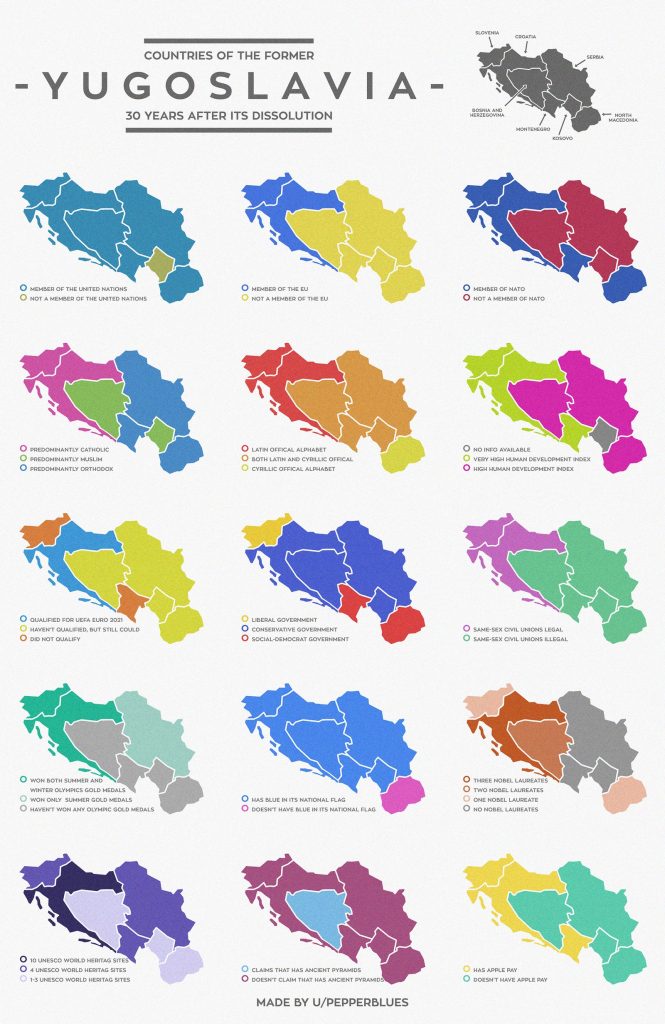
Although Abiy Ahmed Prosperity Party supporters exuberantly welcome his medemer version of a national unity based upon the old model of Amhara elitism studies of the downfall of Yugoslavia just thirty years ago suggest it will similarly fall. Many of those who witnessed the Yugoslavia downfall today point to the fact that political elites tried to force their version of a unity identity while ignoring altogether ethnic and religious differences in the country.
This year marked the 30th anniversary of the breakup of Yugoslavia. What was known as Yugoslavia had several ethnicities including Serbs, Croats, and Slovenes. Although the different groups had similar “racial history” and language there were significant cultural as well as religious differences between the groups that were not “taken into account” in creating the Yugoslavian state in 1918 after World War I.
The monarchy gave way to a communist regime at the end of World War II during which many partisans were split between supporting the Allied and Axis powers. The new communist ideals fashioned under Josip Tito ignored language and ethnicity but instead claimed that a common goal of “self managed socialism” was the main contributing factor to a Yugoslavian nationality.
Historians have noted that the education system and cultural recognition mechanisms of the time did not present the presence of a “multi-cultural” society but only that a history of national unity from a common struggle defined the country.
Upon the death of Tito in 1980 the long standing denial of ethnic identities and their suppression gave way to overflowing cries of discrimination and favoritism. It is interesting that many who have studied this change remark that ethnicity itself was not the cause for change but the existing pattern of political elites of a few ethnic groups to claim their concept of national identity was superior to other groups ideals. Ethnicity became a tool of political power, oppression, and ultimately resulted in the killings of thousands.

Muslims, Christians, Catholics, Orthodox, Serbs, Montenegerins, Macedonian, Bosnians, Croates, and Slovennes all began to be polarized from each other. Even within groups there was division based upon how devoted one was to one’s own ethnicity or religion. In seeking recognition for their own religion it became a political tool for manipulation and oppression as well as ethnicity.
Abiy Ahmed who was once the representative in the Ethiopian Parliament for the Oromo region immediately north of the capital, Addis Ababa, made his early reputation as a mediator between religions and protector of Oromo rights to housing. However over the past two years he has found tremendous political support and power by realigning himself with mostly Amhara elites who have revived the concept of Ethiopia having an Amharic manifest destiny. Like those who tried to create a central unity in Yugoslavia he is supported by academics who speak not in terms of historical fact or scripture but in flagrant political language which proclaims this is the only manner in which Ethiopia as a nation can thrive. That this approach will lead to it becoming an international super power. No regard is given that while for last ten years it approached Gross Domestic Product Growth of almost 10% annually it is now in reality a -2% for this year and in unescapable debt.
As regards those who are not Amharic he is saying that they can be a “part” of this unity if they agree to suppress dissent on his approach. Whereas initially he called for a free press, release of political prisoners, and openness in political discussion this has been transformed to a tyrannical state where dissent is rewarded with a branding of “terrorist” that can lead to imprisonment, confiscation of assets, or even assassinations. Healthcare, banking, communication, food, security, and right to life are reserved for those who agree with the Abiy Ahmed version of medemer while others will be deprived.
Just as in Yugoslavia this strict acceptance of only the Prosperity Party ideal of being an Ethiopia has resulted in open rebellion in not only Tigray but also Beningshagul, Amhara (Qemont and Agaw), Oromo, Somali, Afar, and Gambella regions. The fastest growing revolt is occurring in the region of Oromia of his own ethnic group.
Noted authority on Ethiopia, Alex De Waal, wrote this week that Abiy Ahmed has turned up his rhetoric to excite his supporters while many other African leaders are increasingly shunning him. The United States previously the foremost supporter of Ethiopia finds itself having to impose sanctions because of overwhelming evidence of mass genocide. Both De Waal and United Nations Secretary General Antonio Gutierrez both have indicated that they believe Abiy Ahmed is a risk of destroying Ethiopia if he does not change course. In an interview with Al Jazeera, the UN Secretary General stated that Ethiopia cannot defeat the Tigray forces.


Good observation and thankyou for your contribution.